Executives in Residence
Ab Krall
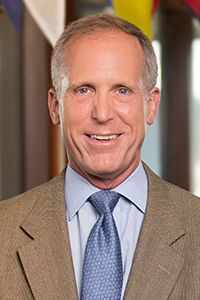 A 40+ year veteran of the consulting industry, Albert "Ab" Krall enjoyed success at Accenture (known as Arthur Andersen Consulting when he started there) as well as Deloitte Consulting. Primarily focused on the domestic telecommunications marketplace with clients that included Verizon, Iridium, AT&T and BellSouth, Ab developed a global mindset while living and working in Japan and Australia. He retired from Deloitte in 2017 as a managing director.
A 40+ year veteran of the consulting industry, Albert "Ab" Krall enjoyed success at Accenture (known as Arthur Andersen Consulting when he started there) as well as Deloitte Consulting. Primarily focused on the domestic telecommunications marketplace with clients that included Verizon, Iridium, AT&T and BellSouth, Ab developed a global mindset while living and working in Japan and Australia. He retired from Deloitte in 2017 as a managing director.
A long-time member of the Smith School Advisory Board, Ab served as chair during the 2014-15 academic year and is also active with the board's committees. For the last few years, he has taken been co-teaching several Smith courses including the Full-Time MBA Business Consulting Practicum, a course where MBA students are paired with companies for four-month consulting projects. To formalize his relationship with the Smith School, Ab became an Executive-in-Residence in 2016.
Ab earned a BS in information systems from Smith in 1981.
Bill Longbrake
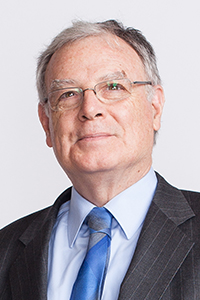 Bill Longbrake has extensive experience in finance and investments, macroeconomics and monetary policy, risk management, housing, and public policy. He has served in business, academic and government organizations.
Bill Longbrake has extensive experience in finance and investments, macroeconomics and monetary policy, risk management, housing, and public policy. He has served in business, academic and government organizations.
Since June 2009 Bill has been an Executive in Residence at the Robert H. Smith School of Business at the University of Maryland and participates in the Center for Financial Policy. Bill regularly mentors students, engages with faculty on research endeavors, and writes a monthly commentary on economic conditions entitled the Longbrake Letter.
He is chairman of the board of HOPE LoanPort, a non-profit organization that provides a data management and communications web portal to housing counselors and home mortgage servicers. He is a nonvoting member of the Washington State Investment Board, which manages over $100 billion in public employee retirement funds, and serves on the Audit and Public Markets Committees. He is a director of City First Bank of DC and serves on the Compensation, Governance, and Loan committees. He is a director of Boeing Employees Credit Union and serves on the Governance and Finance and Risk committees.
He is a member of several committees of the American Bankers Association, including those for Federal Home Loan Banks, government sponsored enterprises, and mortgage markets. He is chairman of the board of trustees of and the College of Wooster; chairman of the board of trustees of Lift Up Africa, a charitable organization that finances humanitarian and sustainable development initiatives on the continent of Africa; and is president of the Longbrake Family Foundation.
He was a trustee of Auburn Theological Seminary from 2008-14; a director of First Financial Northwest, a community bank located in Renton, Washington from 2008-10; a director of the Federal Home Loan Bank of Seattle from 2002-10; and a director of the Washington Financial League from 2002-10.
Between September 2006 and December 2008 he served on a half-time basis as the Anthony T. Cluff Senior Policy Advisor for the Financial Services Roundtable. Members of the Roundtable include the largest financial services companies in the U.S. He assisted in the preparation of "The Financial Services Roundtable Blue Ribbon Commission on Mega-Catastrophes: A Call to Action" and "The Blueprint for Financial Competitiveness". During his time at the Roundtable he also advised the HOPE NOW Alliance and was responsible for coordinating the collection of loan servicing and loss mitigation data.
Longbrake joined Washington Mutual, Inc. in August 1982 and served in many positions until his retirement in September 2008, except from February 1995 to October 1996 when he was chief financial officer and deputy to the chairman for finance at the Federal Deposit Insurance Corporation (FDIC). During his years at Washington Mutual, he helped build the company from a $2.5 billion mutual savings bank located in Washington State to the sixth largest depository institution in the nation.
From 1982 to 1994 Longbrake was chief financial officer of Washington Mutual except for a two-year stint when he was the principal executive responsible for retail banking and home lending. When he returned to Washington Mutual from the FDIC in 1996 he resumed the position of chief financial officer until 2002 when he became the bank's first chief enterprise risk officer. In 2001, Longbrake was named CFO of the Year in the Driving Revenue Growth category by CFO Magazine. From 2004 until retirement he served in a non-executive position as the company's liaison with regulators, legislators, industry trade organizations, and government-sponsored enterprises.
He began his career in Washington, D.C. in 1970, where he served in various government positions until 1982, including acting senior deputy comptroller for policy and senior deputy comptroller for resource management for the Office of the Comptroller of the Currency and financial economist, acting controller and special assistant to the chairman at the FDIC.
He earned his bachelor-of-arts degree in economics from the College of Wooster in 1965, graduating with honors. He earned his master's degree in monetary economics in 1968 and his master of business administration degree in 1969 from the University of Wisconsin. He received his Ph.D. in finance from the University of Maryland in 1976.
Longbrake is active in numerous academic, business and community service organizations, particularly those involving issues surrounding affordable housing and education. He chairs the Washington State Citizens Commission for Performance Measurement of Tax Preferences. He is a member of the Governor's Council of Economic Advisors and was a member of the Infrastructure Financing Task Force for Washington State. He is a member the University of Maryland's Robert H. Smith School of Business Advisory Board. He is Chairman Emeritus of the Financial Services Roundtable's Housing Policy Council.
He was a member of the University of Washington's Michael G. Foster School of Business Advisory Board from 1998 to 2014. He previously served as chairman of the Washington State Affordable Housing Advisory Board, Threshold Housing, the Capitol Hill Housing Improvement Program, and served as a member of the board and chaired the Audit Committee of the Local Initiative Support Corporation (LISC), which provides affordable housing nationwide. He is past president of the Washington State Chapter of Financial Executives International and the Puget Sound Council of Financial Institutions. Previously he was a member of the Fannie Mae National Advisory Council, the Thrift Institutions Advisory Council of the Federal Reserve Board of Governors and the board of directors of America's Community Bankers. From 1993 to 2002 he served on the board of directors of the Presbyterian Publishing Corporation.
Longbrake has published extensively and currently writes a monthly economic newsletter which is distributed by Barnett, Sivon and Natter. He has taught courses in business administration and finance at the University of Maryland and Seattle University. In 2007 he received the Distinguished Alumnus of the Year award from the Robert H. Smith School of Business of the University of Maryland.
William MacDonald
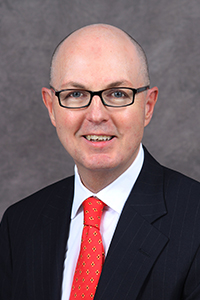 Bill MacDonald recently retired from Bank of America Merrill Lynch after a lengthy career that brought him to just below the C-Suite level. As Global Head of Loan Products for Corporate & Investment Banking, he was responsible for a $2B revenue P&L business unit with operations in New York, Boston, Charlotte, London, Singapore, Tokyo, Mumbai and Sao Paolo. Designated a "person of control", he had regular interaction with federal regulators, including the FRB and OCC.
Bill MacDonald recently retired from Bank of America Merrill Lynch after a lengthy career that brought him to just below the C-Suite level. As Global Head of Loan Products for Corporate & Investment Banking, he was responsible for a $2B revenue P&L business unit with operations in New York, Boston, Charlotte, London, Singapore, Tokyo, Mumbai and Sao Paolo. Designated a "person of control", he had regular interaction with federal regulators, including the FRB and OCC.
Prior leadership roles included Head of Americas Corporate Banking for over a dozen industry coverage verticals; Risk Executive; Workout & Restructuring; Transition Executive for the FleetBoston Financial merger, as well as mid-Atlantic Commercial Banking.
Current activities include Instructor in Finance for the Robert H. Smith School of Business at the University of Maryland; Vice Chairman & ALCO member of the Treasury Department Federal Credit Union and an executive coaching & consulting practice.
Anoop Mehta
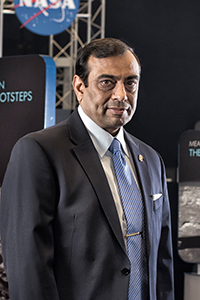 As an Executive in Residence, I am excited to bring my 40+ years of experience in leadership, management, and the accounting profession to the Smith School. Having served as the former CEO of Science Systems and Applications Inc. (SSAI) and currently as the chief strategist for Analytical Mechanics Associates (AMA), I understand the world of business and the power of networking and collaboration. These experiences taught me the importance of networking and working with diverse groups of people. As a result, I rose through the ranks at SSAI, eventually becoming CFO and then CEO, leading the company to a remarkable growth.
As an Executive in Residence, I am excited to bring my 40+ years of experience in leadership, management, and the accounting profession to the Smith School. Having served as the former CEO of Science Systems and Applications Inc. (SSAI) and currently as the chief strategist for Analytical Mechanics Associates (AMA), I understand the world of business and the power of networking and collaboration. These experiences taught me the importance of networking and working with diverse groups of people. As a result, I rose through the ranks at SSAI, eventually becoming CFO and then CEO, leading the company to a remarkable growth.
My leadership roles in professional organizations, including the Association of International Certified Professional Accountants, the American Institute of Certified Public Accountants, and the Maryland Association of CPAs (MACPA, further reinforced the value of networks. Now, as an advisory board member at Smith and the Accounting and Information Assurance department , I am committed to preparing students for the evolving accounting profession. I aim to infuse changes into the curriculum, ensuring our students are future-ready.
My personal and professional success is intertwined with how many people I can help advance their careers and become leaders in the field. Over the past two years, I have spoken to over 11,500 students. In today’s dynamic world, staying connected and lifting each other up is more critical than ever. I look forward to contributing to the Smith School’s mission by mentoring, sharing insights, and fostering connections that empower the next generation of business leaders.
I’m thrilled about the opportunity to mentor students and guide them toward successful careers. Witnessing their growth and helping shape their professional journeys is incredibly rewarding for me. I am also excited to engage with academia, this allows me to stay at the forefront of knowledge. Collaborating with faculty, attending lectures, and participating in research discussions energize my intellectual curiosity. I am hoping to share real-world insights, with this I can influence curriculum development.
Academia provides a rich network of experts, thought leaders, and fellow professionals. Building connections with faculty, students, and industry partners opens doors for collaboration and innovation. As an Executive in Residence, I can contribute thought leadership through guest lectures. These platforms allow me to share experiences and shape discussions.
Clifford Rossi
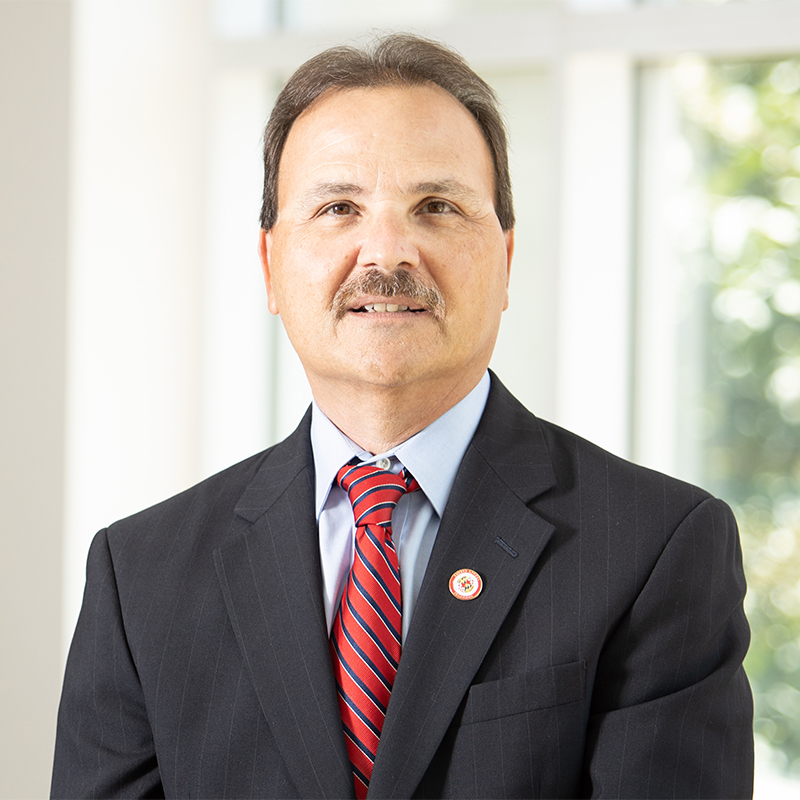 Dr. Clifford Rossi is an Executive-in-Residence and Professor of the Practice at the Robert H. Smith School of Business, University of Maryland. Prior to entering academia, Rossi had nearly 25 years of experience in banking and government, having held senior executive roles in risk management at several of the largest financial services companies.
Dr. Clifford Rossi is an Executive-in-Residence and Professor of the Practice at the Robert H. Smith School of Business, University of Maryland. Prior to entering academia, Rossi had nearly 25 years of experience in banking and government, having held senior executive roles in risk management at several of the largest financial services companies.
His most recent position was Managing Director and Chief Risk Officer for Citigroup’s Consumer Lending Group where he was responsible for overseeing the risk of a $300+B global portfolio of mortgage, home equity, student loans and auto loans with 700 employees under his direction. While there he was intimately involved in Citi’s TARP and stress test activities. He also served as Chief Credit Officer at Washington Mutual (WaMu) and as Managing Director and Chief Risk Officer at Countrywide Bank.
Previous to these assignments, Rossi held senior risk management positions at Freddie Mac and Fannie Mae. He started his career during the thrift crisis at the U.S. Treasury’s Office of Domestic Finance and later at the Office of Thrift Supervision working on key policy issues affecting depositories. Rossi was also an adjunct professor in the Finance Department at the Robert H. Smith School of Business for eight years and has numerous academic and nonacademic articles on banking industry topics. Rossi is frequently quoted on financial policy issues in major newspapers and has appeared on such programs as C-SPAN’s Washington Journal and CNN’s Situation Room. He is currently writing a book, Fundamentals of Risk Management for John Wiley & Sons, Inc. His policy and research interests include GSE reform, housing finance reform , bank capital issues and implications of Dodd-Frank on banking.
Rossi writes a column called “Global Association of Risk Professional's CRO Outlook.”
Wendy Sanhai
 I leverage my 25+ years of leadership experience and technical expertise in medical product development (drugs, biologics and medical devices), R&D and regulatory affairs across the Federal Government, private industry, academia and non-profit organizations, for the benefit of patients.
I leverage my 25+ years of leadership experience and technical expertise in medical product development (drugs, biologics and medical devices), R&D and regulatory affairs across the Federal Government, private industry, academia and non-profit organizations, for the benefit of patients.
Serving on multiple beards and executive committees, I have helped multiple organizations develop strategies for operational efficiencies and corporate governance.
My academic positions at Duke, School of Medicine and the Robert H. Smith School of Business, University of Maryland, allows me to train the next generation of scientific and business leaders, across multiple areas, by working collaboratively with the global organizations to create and implement innovative solutions for real-world problems.